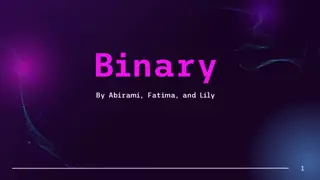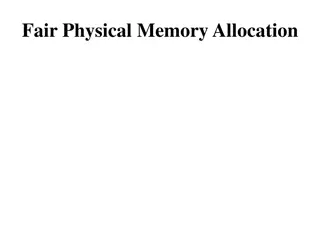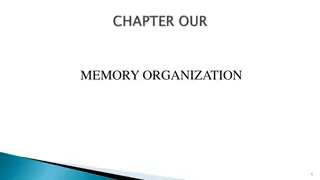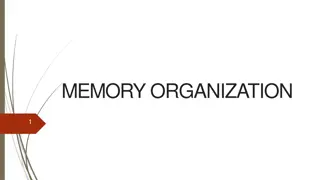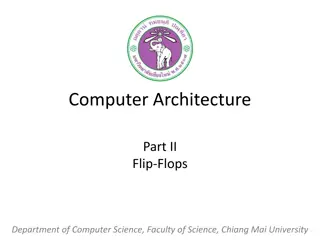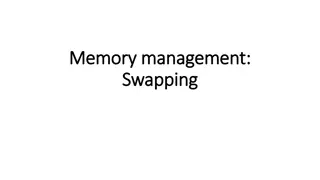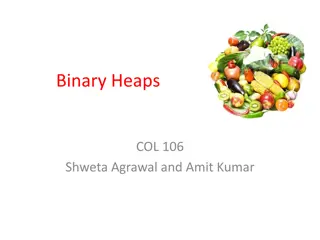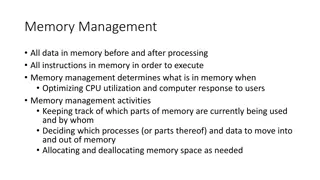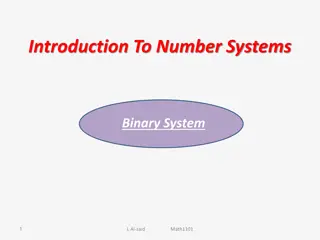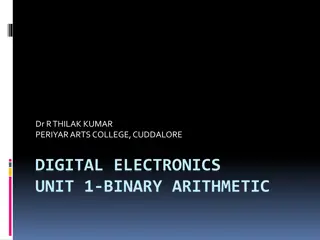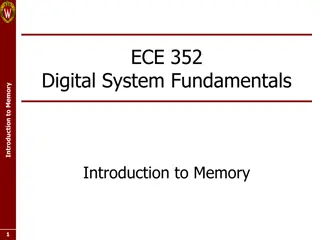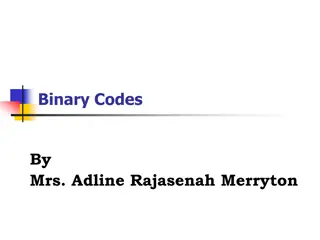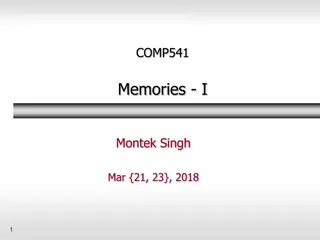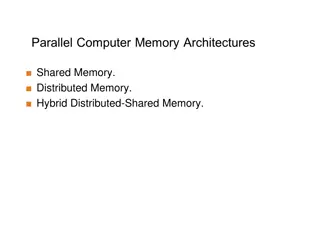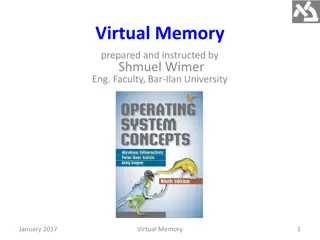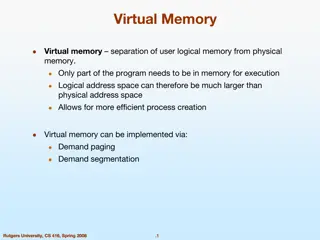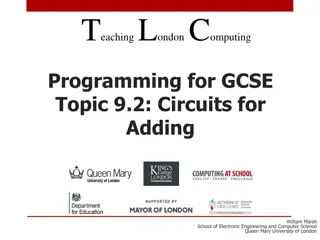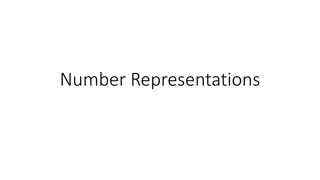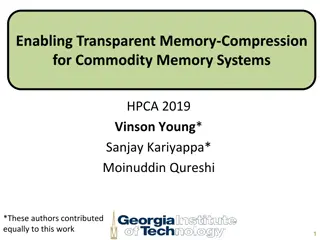Basics of Computer Memory and Binary Operations
The fundamental concepts of computer memory, bits, and bytes, along with operations on bits, binary exercises, and conversions. Learn about the representation of data in binary form, the relationship between bits and integers, binary exercises, and more.
Download Presentation

Please find below an Image/Link to download the presentation.
The content on the website is provided AS IS for your information and personal use only. It may not be sold, licensed, or shared on other websites without obtaining consent from the author.If you encounter any issues during the download, it is possible that the publisher has removed the file from their server.
You are allowed to download the files provided on this website for personal or commercial use, subject to the condition that they are used lawfully. All files are the property of their respective owners.
The content on the website is provided AS IS for your information and personal use only. It may not be sold, licensed, or shared on other websites without obtaining consent from the author.
E N D
Presentation Transcript
` Creating an intersectional, inclusive and empowering curriculum
Context Aims of LiberatEd Student involvement The University s strategic drivers Staff involvement
Context Students across Schools have been running workshops on the underrepresentation of marginalised voices within their curricula, and how teaching can become more inclusive The Senate Learning Teaching Policy Group has been discussing LiberatEd , and most Heads of School, Undergraduate and Postgraduate Teaching have been made aware of the project
What is LiberatEd? LiberatEd is an initiative created by Edinburgh University Students' Association and led by Black and Minority Ethnic (BME), Disabled, LGBT+ and Women students from across the University, aimed at challenging the academic establishment to become more diverse, more inclusive, and more critical of historically dominant narratives.
Why is it important: curriculum content NUS Race for Equality - 42% of Black students said the curriculum did not reflect issues of diversity, equality and discrimination. 33% of Black students they did not feel able to bring their perspectives as Black students in to lectures, seminars and tutorials. Education Beyond the Straight and Narrow
Why is it important: educational environment 23% of Black Students described there learning environment as clique, 17% as isolating and 7% as racist. One in 10 trans students never feel comfortable to speak up in class. Almost one in four women do not feel confident to speak up in the classroom. 16% of incidents of sexual harassment occur in a learning environment
What is it important: support Black students - teachers did not provide the same level of attention or encouragement they would to non-Black students Many disabled students face learning disadvantages if they don t get appropriate support.
Why is it important: assessment Black students report low levels of satisfaction with assessment and feedback. Need for anonymous marking Inaccessible/ poor communication of standards or criteria used for assessment Inclusive Assessment
Why is it important: attainment In 2013, there was a 16.1% gap between the numbers of 2:1 or 1st degrees awarded to White UK-domiciled and BME UK-domiciled students.
Content Diversifying existing Eurocentric and male- dominated reading lists to include academics and texts from underrepresented backgrounds Mainstreaming intersectional and critical perspectives throughout curricula and at all levels of study, including at Pre-Honours
Teaching Ensuring that teaching and assessment methods are inclusive, for example, by empowering students from underrepresented groups to make their voices heard in lectures, tutorials and labs Equipping all teaching staff with the knowledge, skills and confidence to challenge problematic behaviour, including racist, sexist, ableist, homophobic and transphobic microaggressions
Career development and progression for staff and students Greater support for BME, Disabled, LGBT+ and Women academics, and providing both academics and students from underrepresented groups with opportunities for career development and progression
Pathways and instruments for change within Schools i) Lobbying for changes to Institutional processes ii) Staff-student dialogue
Institutional processes and procedures Board of Studies course approval Modules that credit collaboration between staff and students on projects that diversify the curriculum Surveys of courses that provide section on the extent of inclusion, equality and diversity within course Looking at recalibration of curricula through Equality Challenge Unit (ECU) suggestions
The Students Association has been working with Schools on ATHENA Swan Charter submissions The University of Edinburgh and the Students Association is working on a report about the BME attainment gap
New Learning and Teaching Strategy We will develop and enhance our curriculum by: Embedding the University s excellence in research in our teaching and assessment; Using the curriculum to promote inclusion, equality and diversity; Supporting a culture of active and engaged students by providing varied opportunities for independent and student-led-learning within and beyond students main programmes of study; Developing opportunities for experiential learning on campus, in the community, and in businesses and other organisations, nationally and internationally; Committing to the creative use of digital technologies in our teaching and assessment where appropriate whether online, blended or on-campus; and Utilising our world-class libraries and collections in innovative and research-led ways to enrich our curriculum
How students can get involved Talking to class and elected reps about subjects or perspectives which are missing from your courses and asking them to pass this information on to staff. Alternatively, you could include suggestions for reading at a Staff-Student Liaision Committee, or in your mid-semester feedback. Receive training from student association staff about liberating the curriculum Requesting texts from marginalised authors and academics be added to the Library's collection using the Request a Book form on the University's website.
Getting involved on social media Arranging a LiberatEd workshop in Schools to gather feedback on subject- specific issues relating to liberating the curriculum. Students have already run LiberatEd workshops in the Schools of Literatures, Languages and Cultures; History, Classics and Archaeology; Social and Political Science; and Philosophy, Psychology and Language Science. Organising an event focusing on the experiences of a specific marginalised group in Higher Education.
Exercise: Think about your strategy Who would you need to influence? How would you influence? What might the potential barriers be and how would you overcome them? What outcomes would you want to achieve?


